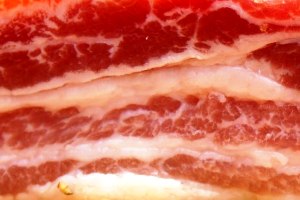RESEARCH: Influence of lactic acid and chilling on bacteria in pork

US researchers have published a study in the Journal of Food Production on the effects of lactic acid and commercial chilling on the survival of Samonella, Yersinia enterocolitica and Campylobacter coli in pork meat. The researchers conclude that the addition of lactic acid causes significant reduction of Salmonella, Y. enterocolitica, and C. coli in pork variety meats.
Current industry chilling practices with and without the application of 2% L-lactic acid were compared for their effectiveness at reducing levels of Salmonella, Yersinia enterocolitica, and Campylobacter coli on pork variety meats.
Pork variety meats (livers, intestines, hearts, and stomachs) were inoculated individually with one of the three pathogens and subjected to five different treatment combinations that included one or more of the following: water wash (25°C), lactic acid spray (2%, 40 to 50°C), chilling (4°C), and freezing (-15°C). Samples were analysed before treatment, after each treatment step, and after 2, 4, and 6 months of frozen storage.
Results showed that when a lactic acid spray was used in combination with water spray, immediate reductions were approximately 0.5 log CFU per sample of Salmonella, 0.8 log CFU per sample of Y. enterocolitica, and 1.1 log CFU per sample of C. coli. Chilling, both alone and in combination with spray treatments, had little effect on pathogens, while freezing resulted in additional 0.5-log CFU per sample reductions in levels of Salmonella and Y. enterocolitica, and an additional 1.0-log CFU per sample reduction in levels of C. coli.
While reductions of at least 1 log CFU per sample were observed on variety meats treated with only a water wash and subsequently frozen, samples treated with lactic acid had greater additional reductions than those treated with only a water spray throughout frozen storage.
The results of this study suggest that the use of lactic acid as a decontamination intervention, when used in combination with good manufacturing practices during processing, causes significant reductions in levels of Salmonella, Y. enterocolitica, and C. coli on pork variety meats.
Source: Journal of Food Protection











